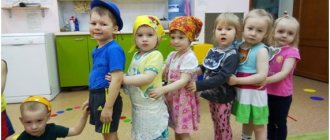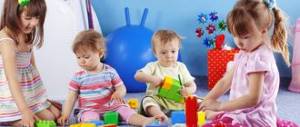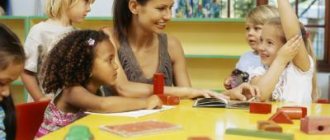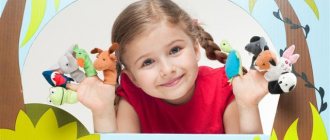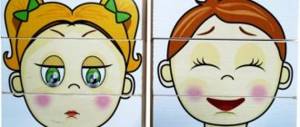Each person lives in society and occupies a certain place in it. Consequently, he necessarily has one or another relationship with the people around him. Through the process of communication, we begin to understand ourselves and others, and also evaluate their actions and feelings. All this ultimately allows each of us to realize ourselves as individuals and take our own place in the society in which we live.
However, a characteristic feature of the modern era is the replacement of much-needed face-to-face communication with electronic communications. Many children who have not yet reached the age of two easily master their parents’ smartphones and tablets. At the same time, some children experience social and psychological problems in terms of communication. They do not know how to do this and, as it seems at first glance, they do not want to do this at all.
The insufficient development of communication skills in preschool children is a cause for serious concern for teachers and psychologists. After all, communication is a mandatory attribute, without which the development of the human personality becomes impossible. That is why this article will definitely be useful to those parents who want their baby to successfully develop their communication skills. This will allow him to remove barriers to communication with peers and adults.
About communication
What does this concept mean? The word “communication” itself comes to us from the Latin language. In it, communicatio means “transfer, message,” and communicare means “to convey, communicate, talk, make common.”
From a scientific point of view, the term “communication” can be clarified by giving it various definitions. Thus, in philosophy, communication is understood as communication. That is, information exchange carried out between living organisms. This process is multifaceted and complex, implying the establishment of contacts between different people, as well as their development. This type of communication is also called intergroup or interpersonal. Its specific name will depend on the number of participants. People's communication skills allow them to express their feelings, opinions, ideas. They are also necessary for a person to understand the meaning of what was done for him or said to him.
According to experts in the field of psychology, communication is the ability of an individual to communicate with others, regardless of their age, cultural and social education, development and level of life experience.
In addition, such skills are also referred to as effective communication skills. Such skills express the degree of ease of establishing contacts between individuals or entire groups of them. Communication skills also illustrate a person's ability to carry on a conversation, assert their legal rights, and reach an agreement. Such skills also include syntonic communication (non-conflict, friendly and neutral).
Tips for parents
Some tips may seem obvious, but this will only prove how important they are and need to be put into practice.
Talk to your child regularly. If the child is not very sociable, you need to first provoke him into dialogues with you. Come up with interesting topics that might be of interest to him, ask open-ended questions, encourage long-term thinking.
You should not philosophize and try to interest a child in something that is distant to him. Talk about what's around him, make the dialogue relevant. At the same time, constantly introduce new words and concepts.
Ask your child to describe their day. Encourage your child to talk about what happened that day. You know that often teenage schoolchildren answer the question “How are things at school?” They answer “Fine” and go to their room.
Better ask them “What did you like at school today and what didn’t?” This will teach him to analyze his day and describe his feelings.
Complete what your child says. You should not communicate in interview mode - it looks fake and dull. Instead, make it a habit to complete your child's last sentence.
If your child boasts about his drawing, tell him, “Wow, that looks like you worked really hard and had a lot of patience. What would you like to draw next?
Teach your child body language. We know that most information during a conversation is conveyed through body language, so this skill needs to be developed from childhood.
Tell your child, “I crossed my arms because I'm a little angry at you,” or “I wish you would look me in the eyes when you talk to me.”
You can also ask your child to show how his favorite characters from fairy tales and cartoons move. It is especially important that these are moments when the characters express any strong emotions.
Read together. It doesn't matter what you read. But it is desirable that the book have a lot of dialogue. Even if your child chooses the same books every night, he will develop a better understanding of the characters, plot, and words used.
Ask for opinions. Effective communication requires the ability to reflect on your feelings. So ask your child to weigh in on daily decisions.
It could be something as simple as, “When do you think we should go to the library?” or as complex as, “Where do you think we should go on vacation?” At the same time, teach your child to weigh the pros and cons.
Encourage your child to keep a journal. The best way to teach your child to express himself correctly is to encourage him to keep a journal.
Journaling about daily activities and feelings will help your child formulate thoughts. This will make him feel more prepared to answer the questions.
Communication skills in children
Every person is capable of communicating to one degree or another from an early age. Thus, a crying baby, who is trying to get his mother’s attention, begins to enter into communicative relationships and interact socially with other people. However, crying is clearly not enough for a little person to achieve success. It is very important that over time the baby begins to effectively build communication with other people.
What are the communication skills that children have? According to psychologists, the success of developing and consolidating communication skills in children depends on several factors. Among them:
- Desire to communicate. Implementing communication without motivation is impossible. Autism can serve as confirmation of this. These patients do not have any intellectual problems. They just lack the motivation to open their inner world to others. Autistic people are psychologically developed. However, they lack social development.
- The ability to listen to your interlocutor and hear him. To communicate, it is very important to show interest in others and understand what they want to communicate.
- Emotional interaction. Effective communication becomes impossible without empathy and compassion.
- Knowledge of the rules of communication and the ability to apply them in practice. There are some unwritten norms that may differ slightly from one society to another. The development of communication skills in preschool children is possible only if they master these norms. Otherwise, they will certainly have difficulty establishing social connections in the future. For example, a child must be polite. Anyone who ignores this rule will become a bully in the eyes of others.
To develop communication skills in preschool children, psychologists recommend that parents limit their time spent in front of a computer monitor, TV screen or tablet. It has been established that those kids who practically never part with gadgets do not know how to communicate. When interacting with such devices, the child perceives the information given to him passively. This is clearly not enough for the development of communication skills in preschool children. It has already been proven that children who play computer games too often speak worse than their peers. In addition, it is difficult for them to understand the emotional reaction of others to certain events and actions.
Self-knowledge as a factor in effective communication
Only a person who knows himself well can be truly successful in communication. Therefore, it is very important to teach a preschooler to navigate his own personality and his emotions:
- Discuss with your child his feelings. Ask your child questions about what and why made him sad and what made him happy;
- Ask your child to draw his own self-portrait. Let him tell you why he chose certain colors, surrounded himself with certain objects, etc.;
- If a child behaves inappropriately, do not try to correct his behavior by yelling. Ask why the child’s behavior is unacceptable and why it caused a negative reaction from the parents;
- Never call your child names or label him. This contributes to the formation of a negative self-concept. Remember: you can criticize behavior, not personality. Learn to say: “I am dissatisfied with your behavior because...”, and not “You are bad”;
- Refrain from unduly criticizing your child.
Methods for developing communication skills
Of course, you shouldn’t go to the other extreme and praise everything your baby does: it’s important to find a middle ground. Children whom I criticize too often can grow up to be painfully shy: they are afraid in advance of doing something that will cause a negative reaction. It is better to adopt the strategy “You are doing well, but I can help you do even better.”
Advice: the development of communication abilities in preschoolers is unthinkable without the parallel development of logical thinking.
Theatrical activity as a method of communicative development
Indeed, in the process of communicative development, it is very important to predict the reaction of the interlocutor and learn to correctly structure your own speech.
The main task of parents of preschoolers is to teach children to interact with others, both with other children and with adults, and to be part of society. It is very important to do this: the better the child knows communication techniques, the easier it will be for him to adapt to the school community!
Situational-personal communication
Babies are ready for this form of communication at about 2-3 months of age. It arises due to the child’s need for the attention of adults. In infancy, such communication is leading.
This first form of communication skills manifests itself in the “animation complex.” These are various emotional and positive reactions of a baby to an adult. They are accompanied by active movements, a smile, fixation of the gaze on the person approaching, listening to his voice, as well as vocalization. Such manifestations indicate the development of the first communication skills of young children. Contact with an adult is very necessary for a child, which is why the baby demands it.
Situational business communication
The next stage in the development of social and communication skills in children occurs at approximately six months of the baby’s life. At this time, a situational business form develops, allowing the baby to communicate with adults at a new level. It exists until the child is 3 years old.
The communicative skills of children at this age lie in the need for cooperation within the framework of object-tool activity, which prevails in them during this period of life. The main reason for contact between a child and an adult is now a common cause for both. This is practical cooperation. That is why, of all the motives for communication, business comes to the fore.
The child, together with an adult who is the organizer and assistant of the activity, manipulates the objects at his disposal. They also perform complex actions using them.
At the same time, the adult shows the child what he can do with various things and how to use them. At the same time, the qualities of objects are revealed to the child, which the baby would hardly have been able to discover on his own.
Social and communication skills of preschool children
In childhood, languages are learned, methods of information exchange are mastered, and the ability to listen and understand the interlocutor is developed. All this is included in the definition of communicative competence. The ability to conduct a conversation, ask questions, participate in a collective discussion, along with the use of non-verbal means (tone of voice, gestures, facial expressions), is the basis of a dialogue culture. Social skills include the ability to express feelings, communicate with people, and control emotions.
Communication is important for children
Nonverbal stage
The stages of development of children’s communication skills described above take place without the use of speech. Of course, this form of contact is available to people of any age. However, according to scientists, children are characterized by the most vivid facial expressions due to the lack of a framework of norms and conventions. This skill becomes especially important when establishing contact with peers. Younger preschoolers cannot yet meet a new friend and agree on anything with him using speech. And this is where facial expressions come to the aid of children, serving as a kind of handy tool for them. So, while in the sandbox, a preschooler smiles at his new friend, thereby inviting him to make Easter cakes together. Such a proposal can also be confirmed quite simply. A mold or spatula is handed to a new friend.
In addition, kids always strive to show what they already know. They try to attract attention with the help of touches, and they use their hands to demonstrate the sand castle.
Preschoolers, as a rule, also try to express their likes or dislikes non-verbally. If they love someone, then that person gets kisses and hugs. Those children and adults who do not enjoy the preschooler's favor see his frowning brow. In addition, the child can simply turn away or hide behind his mother.
Musical communication games
Musical communication games have the same goals as classical ones. They try to encourage children to build relationships.
In the process, conditions appear for the free manifestation of personal qualities. The only difference is the presence of sound.
Danish folk tune
Another name for the game is “Hello!” The presenter turns on the music. Players perform dance moves until they hear a long chord. At this point they must shake hands with the other participant. The dance then continues until the next long chord. Every time you need to say hello to a new player.
“We’ll show you what we saw”
Children are divided into several teams. Each should have from 2 to 6 people. After this, time is given for preparation, during which the participants come up with what they will show. This could be a small skit, a demonstration of some kind of sport, or an imitation of the behavior of an animal. Then the first team silently shows what they have planned, and the others must guess what the participants were depicting. After this the next group performs.
"Look for music"
To the music, children become pairs and line up in a circle so that one stands with his back to the center, and the other with his face. The driver is in the middle. He gives the command “Look!”, after which everyone who is facing the center runs into a circle. The rest turn around and wait for the next round, in which they will be the ones searching. Music plays and the participants dance inside the circle. When silence falls, players must quickly find a match from those who are standing still. The one who is left alone becomes the next leader.
"Animal Piano"
Children squat down in one row. They act as keys on a piano. Each child is given a card with a picture of an animal whose voice he becomes. The presenter walks past the piano and presses the “keys”, i.e. touches children's heads. Each player must respond with the voice of the corresponding animal.
The emergence of speech
At the next stage in the development of communication skills in children, a transformation of objective activity occurs. The child begins to master speech. We can talk about a new stage in the development of communication that occurs between a child and an adult when the baby begins to ask his first questions: “Why?”, “Where from?”, “Why?”, “How?”. This form of communication is non-situational and cognitive. It occurs in the primary and secondary preschool years. This age is 3-5 years. The development of children's communication skills stems from their need to be treated with respect by adults. The child is encouraged to develop such communication by cognitive motives. With its help, children expand the scope of the world that is accessible to their knowledge. Also, the interconnection of events and cause-and-effect relationships between phenomena and objects are revealed to children. Children are increasingly beginning to be attracted to what is happening in the social sphere.
Children's communication and speech skills are increasingly developing as their vocabulary expands. The child still continues to send nonverbal signals. However, he already adds the simplest explanations to them, for example: “My car” or “Pour sand into a bucket.”
Four-year-old preschoolers can already easily pronounce declarative sentences. While interacting with their peers, they develop a sense of belonging to society. At the same time, they joyfully state: “We run,” “We ride,” etc.
Five-year-old children who begin to invite peers to play actively use sentences with more complex structures. They might say something like, “Let’s play shop. You will be the seller, and I will be the buyer."
Sometimes conflict situations arise when younger preschoolers communicate. As a rule, they are provoked by children's egocentrism. This happens, for example, when a child does not agree to give up his toy. Children who see a beautiful doll or car from another child can also create a conflict situation. They want to immediately receive the item of interest. In both cases, adults should be nearby, explaining to the preschooler how to make a request to his peer to share the toy. It is also important to teach little communicators polite phrases that are accepted in society to regulate communication.
Preschool children's verbal communication skills develop particularly well by age five. At this age, children already quite fully master coherent speech, and also begin to realize how important words are for communication. At this stage, communication skills become especially important for the little person.
Extra-situational-personal form
The communication skills of children of senior preschool age are characterized by the emergence of the highest form of communication in this age period. It is called non-situational-personal. It arises due to the need for empathy and mutual understanding.
The dominant motive for communication in this case becomes personal. This form of communication has a direct connection with the highest conditions in preschool age during the development of play activity. The child begins to pay more attention to the features that take place in interpersonal relationships, that is, those that exist at work with his parents, in his family, etc.
It is typical for communication skills in children of senior preschool age that children are already beginning to navigate well in a peer group. In addition, they establish diverse relationships with those people who surround them. Among the characteristics of children with communication skills that are at the proper level, one can highlight their excellent assimilation of the rules of communication, as well as the understanding of their responsibilities and rights. Such a child quickly becomes accustomed to the moral and moral values of society.
Interpersonal contacts in a group of junior preschoolers
In addition to communicating with teachers and parents, children need communication with peers. At the same time, personal interaction in early age groups also has dynamics.
The communication skills of children of primary preschool age are not yet well developed. That is why in such groups it is often possible to observe that children carry out their activities nearby, but not together. This stage is called pre-cooperation. Communicating with peers, each of the kids carries out the process of object-representative actions. They only drive their car, rock only their doll, etc.
As communication skills develop in children of primary preschool age, joint actions gradually arise between them. However, at the first stage this is only a mechanical fusion and participation, in which mutual agreement is expressed to a minimal extent.
As children develop social and communication skills, all their joint actions in the group begin to acquire elements of cooperation. This is manifested in the establishment of selective and emotional contacts with their peers. The unification of children occurs on the basis of common gaming interests. Adults play an important role in the proper organization of such communication.
The development of communication skills in children gives them a subjective attitude towards their peers. They become partners in joint activities, and playing without them is simply no longer interesting.
During this period, the child actively develops awareness of himself as a subject participating in joint activities. This process is most noticeable in role-playing games. It is in them that preschoolers focus both on the plot and on their peer with his level of skills and capabilities, with his area of interest.
As preschool children develop communication skills, they may develop a desire to collaborate in order to achieve a common goal. At the same time, the first gaming associations in their lives are created, which in most cases are of a very unstable nature. Dyads are predominant in children and triads are much less common.
The main requirement that is presented to a peer before accepting him into a joint game is that he possesses the necessary skills. Moreover, each child determines his attitude towards his peer based more on emotional than on rational motives. The actions of another are assessed quite simply. He gave me a toy - it was good.
Adults help children make value judgments, and, consequently, build evaluative relationships. Younger preschoolers often turn to them to clarify the rules of interaction.
By the fifth year of life, the connections that take place between children are further strengthened, becoming more stable. They begin to show likes and dislikes.
Social and communication skills of children in early preschool age, as a rule, have an emotional and practical form. The main reason for communicating with each other is joint games, activities, as well as performing various household duties. Preschoolers strive to attract attention and also get their grade. At the same time, selectivity in communication is also noticeable.
Interpersonal contacts in a group of older preschoolers
With age, children's communication skills further develop. For older preschoolers, role-playing games become the leading activity. By uniting for them, children demonstrate commonality of requirements, joint planning and coordination of actions. A child at this age already begins to take into account the interests of his partners. There is a feeling of mutual support, camaraderie, as well as empathy for failures and successes. Children begin to realize how effective collaboratively organized activities can be. At this age, as a rule, dyads predominate, which are very stable associations. But at the same time, groups consisting of three people also arise. Five-year-old children create “pure” associations by gender.
Well-developed communication skills of preschoolers allow them to demonstrate their ability to organize games. In this case, the desire for justice, friendliness, kindness, as well as the breadth of outlook and external attractiveness of the child are manifested.
When communication skills in children are impaired, children are not accepted into games. This happens due to defects in their moral and volitional sphere, unattractiveness to peers and isolation.
The relationships of 5-year-old children, as a rule, are determined by the absence or presence in the child of those moral qualities that are predominant for the group. And here the role of teachers is very important. They must diagnose the communication skills of preschool children and organize proper communication between students. This will eliminate the possibility of a negative emotional state in the child.
In the fifth year of life, role-playing games become truly collective. Moreover, they begin to be built on the basis of cooperation. A child at this age does everything to get his peers to pay attention to him. And here, in communication between children, a phenomenon arises that is called the “invisible mirror.” The child sees himself in his peer, and from a positive side. This situation changes a little later, by the sixth year of life. The child is already beginning to see the peer himself, and most of all the shortcomings of the latter. This feature in the perception of children in the group is combined with a zealous interest in all their actions and actions.
The development of communication skills of preschool children leads to the fact that at the age of 6-7 years, an extra-situational business type of communication begins to appear in their communication with peers. At the same time, the child not only considers specific typical situations, but also generalizes his idea of the world around him.
Typical mistakes when forming a preschooler's behavioral model
Psychology identifies several types of behavior patterns of foolish children created as a result of improper family upbringing:
- "Hope, the pride of the family." From the moment the baby is born, the life of all family members is dedicated to their beloved child. From the first days, the baby's relatives have no doubt that an exceptional little one was born. Parents, grandparents are sure that the offspring is superior in all respects to other peers, fame and success await him. Such a son is forgiven all his whims and all his wishes are fulfilled. As a result, a selfish, spoiled child grows up.
- "Mom's favorite." It could be dad's favorite or grandma's treasure. Typically, such children are raised in families with more than one child. Each parent has their own favorite, who needs to be pampered and forgiven for mistakes. As a result of this approach to education, foolish children feel a lack of love from their second parent, and in addition, a negative feeling of competition towards their brother or sister arises.
- “Obedient smart girl” or obedient good boy. From birth, the concept of decent and indecent is instilled in the foolish child. Their own rules are established to show good upbringing and obedience of the “trained” offspring. The interests of the child, which do not coincide with the beautiful picture of proper upbringing, are simply ignored. It is about such children that they say “there are devils in still waters.” Most often, it is obedient good boys who, having escaped from the tutelage of adults, commit acts that go beyond the norms of decency and morality.
- "Poor Cinderella." In families with several children, there is always someone's favorite and a poor Cinderella who is burdened with all the chores around the house. Usually this role goes to a girl. Adults do not consider her beautiful; they do not expect any achievements from her. From early childhood, relatives instill in such a child that the child’s goal is to serve his successful brothers and sisters. The baby develops a huge inferiority complex, instills a sense of lack of independence, and cultivates envy.
- "Crystal Vase". Having frightened his relatives with his illness in early childhood, such a little man forever remains like a crystal vase for his parents. The baby must be protected from wind, sun, rain, and snow. The baby is very fragile and should not strain himself, much less do anything around the house. Such children consider themselves to be eternal victims of circumstances, have absolutely no initiative, and believe that everyone around them should give them attention and make concessions.
- "Walking problem." A mischievous temperament, increased hyperactivity - all these qualities keep family members on edge. The kid creates eternal problems for the family, he does not listen to reprimands, and is not afraid of punishment. Constant notations fall on deaf ears. Psychologists believe that the appearance of such a child in a family is not due to the incorrigible character and poor upbringing of a fidget. Most often, complaints about the incorrigibility of a mischievous child are due to a lack of desire to educate a preschooler.
- "The culprit of all troubles." The poor little one is accused of all the misdeeds he has and has not committed. He annoys everyone. Household members are angry at his gait, his voice, the way the little one walks. The poor little man serves as a lightning rod for the bad mood of the family members. Living in eternal fear of receiving punishment, almost always physical, destroys the psyche of the foolish, turns him into a frightened, driven outcast.
Disadvantages in developing communication skills are not always noticeable to household members while the child develops in the confined space of the family. The time has come to send your fidget to kindergarten or take him to a preparatory group to prepare for school. All flaws in the development of communication and the ability to compromise among peers immediately come to the fore.
Ignorance of the simplest methods of communication and inability to communicate immediately create problems for preschool children. The children's group lives by its own rules, different from those accepted in the family. The interests of preschool children collide; not every child knows how to negotiate. Often the issue of leadership in a group is resolved by a banal fight. Every preschooler was taught at home that his needs were the most important, his whims and requests were fulfilled very quickly. But in the kindergarten a confrontation between selfish natures begins. Nobody wants to make concessions.
Aggressive preschoolers suppress quiet domestic children who grew up in greenhouse conditions. Insecure, complex kids are afraid of open confrontation with an ill-mannered, aggressive, assertive peer. Such a juvenile bully begins to feel superior, compensating for his own injured feeling of inferiority that arose from a lack of parental love.
Psychologists have identified several reasons that interfere with the interaction of preschool children:
- aggressive behavior, provoking conflicts with the subsequent solution of all problems by force;
- developing painful mental states in children: excitability, nervousness, constant mood swings, fears, heightened anxiety, excessive tearfulness;
- inability to feel the emotions of peers, emotional deafness;
- ignoring all contacts, isolation of one’s own world, where there is no access for outsiders.
Educators and psychologists, together with parents, will have to work with such children for a long time in order to correct the behavior of preschoolers and prepare them for the transition to school society. Only through joint efforts can we resolve the issue of how to develop communication skills in preschool children.
